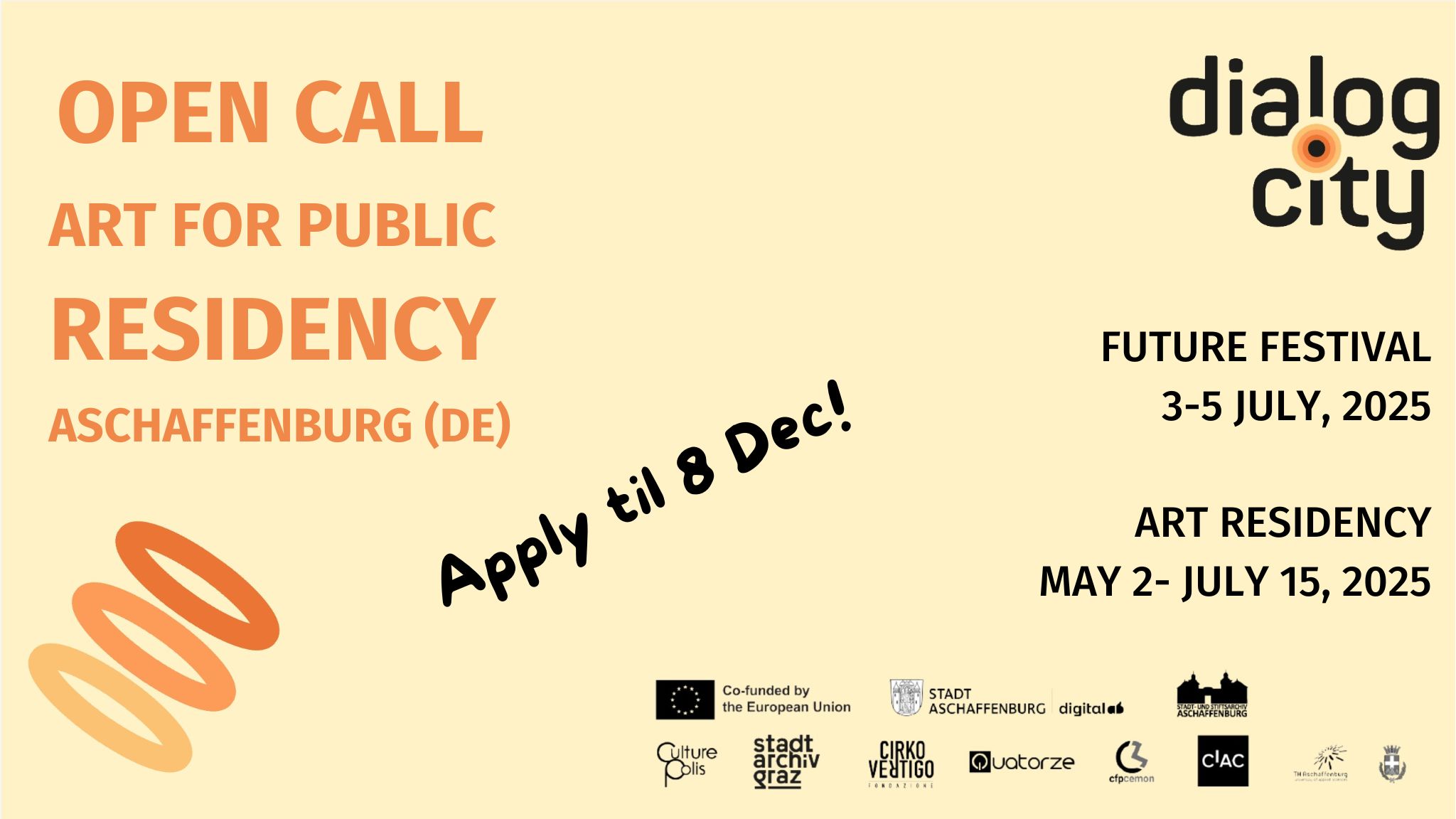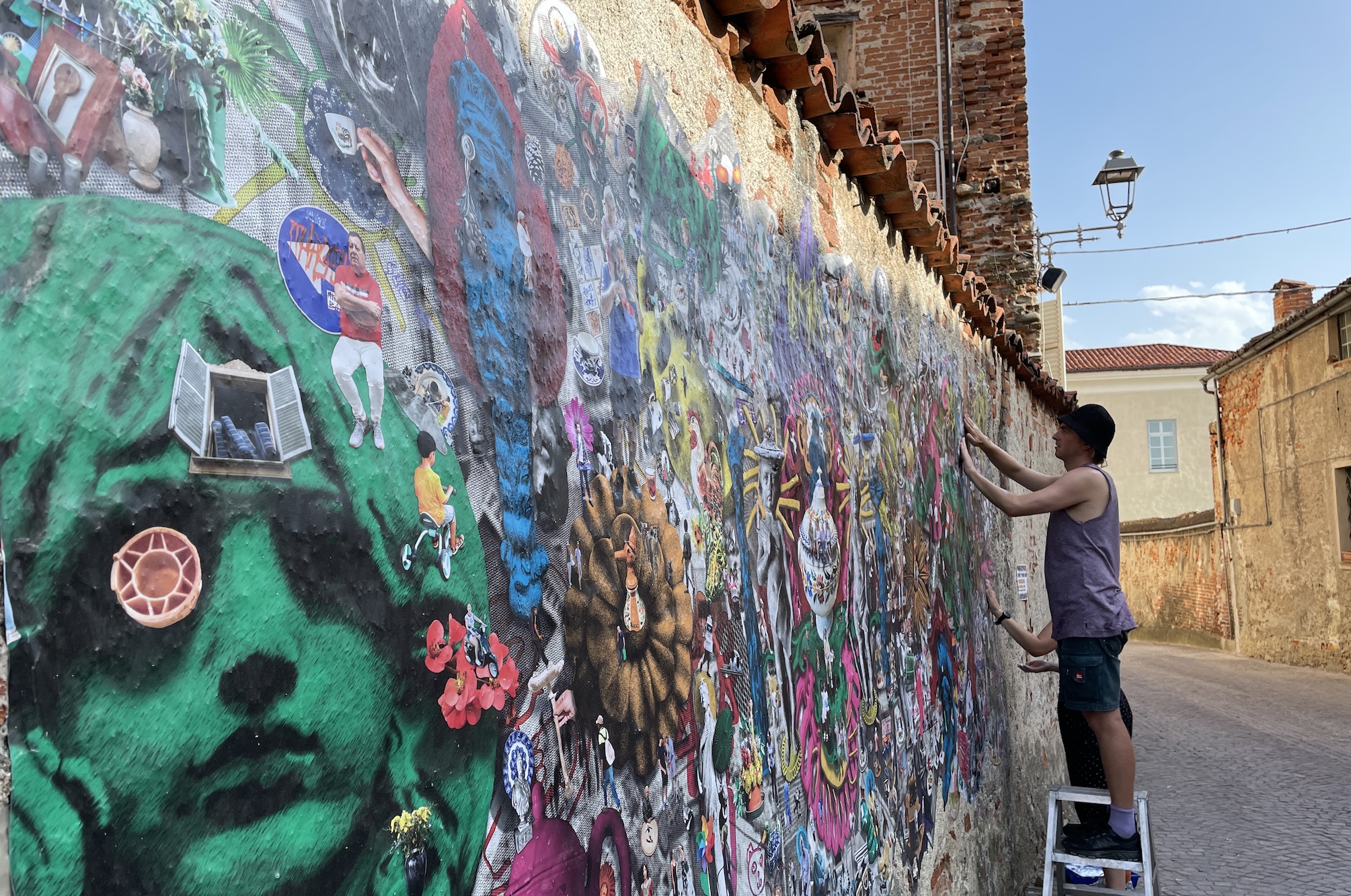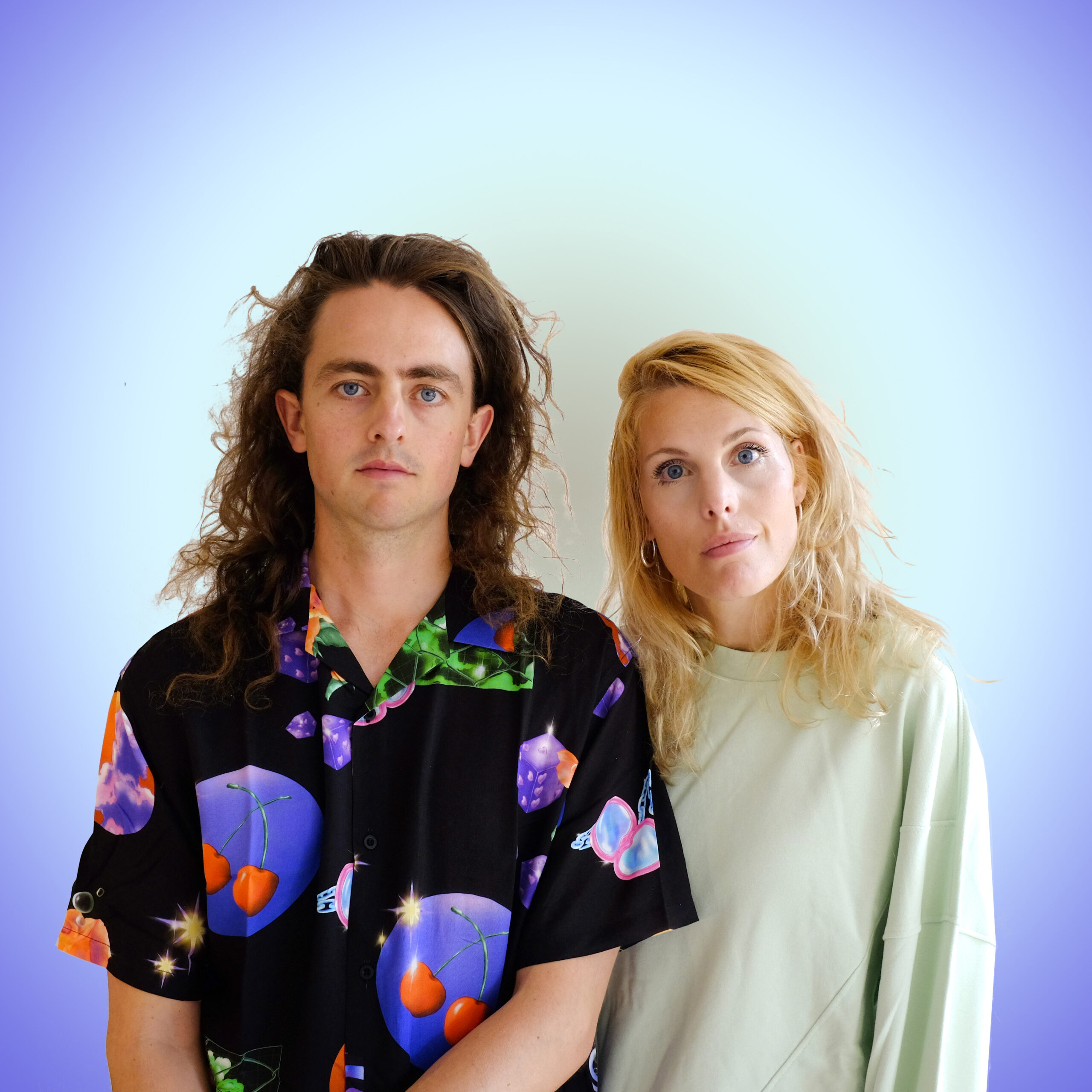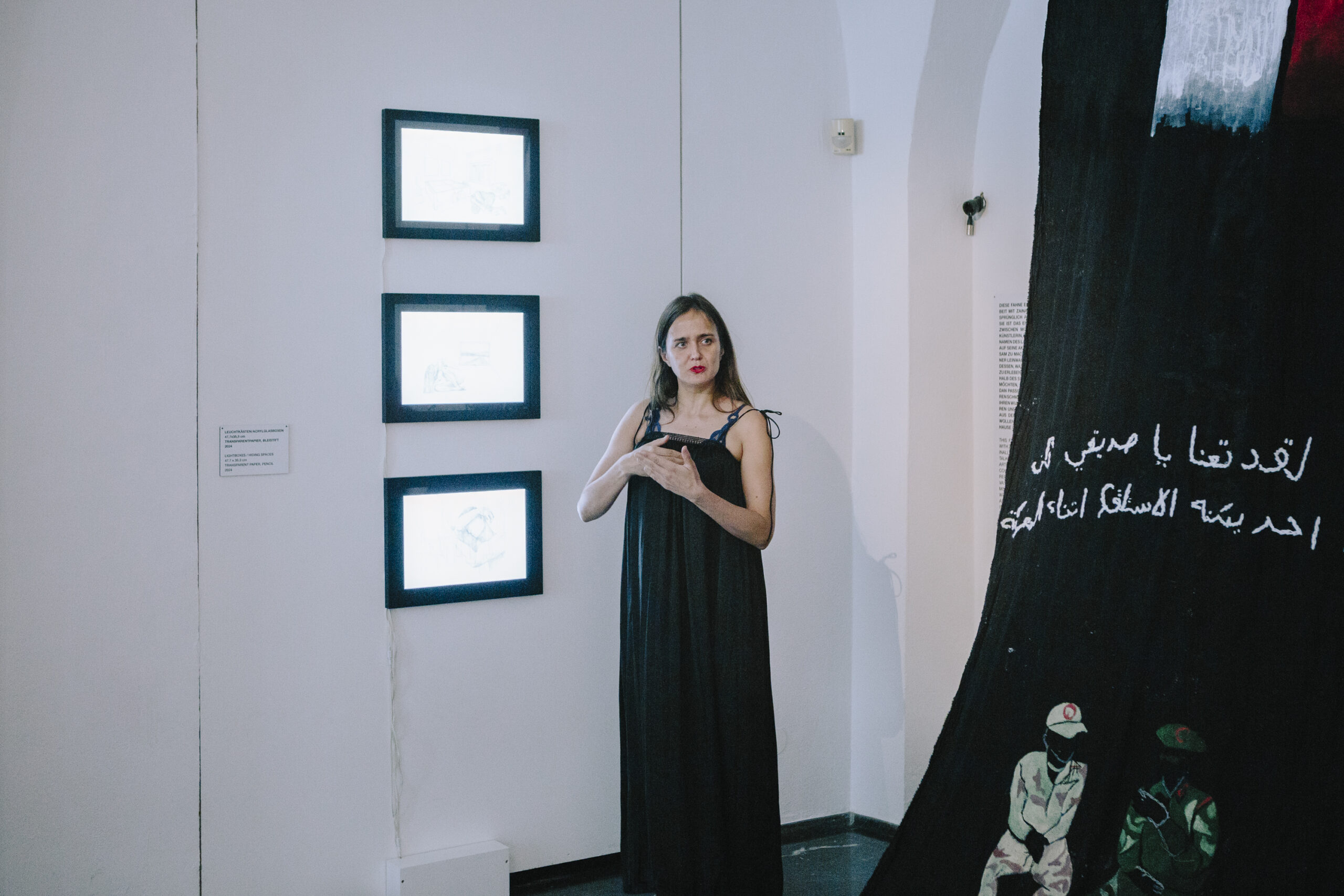Intro
The annual FUTURE FESTIVALS serve as both analogue and digital platforms for the EU project DIALOG CITY, aiming to reach a broad and diverse audience. The participating European cities included Mondoví (IT) in 2023 and Graz (AT) in 2024. The artistic projects developed during these residencies were showcased on-site at the FUTURE FESTIVALS as well as presented online. The next FUTURE FESTIVAL will take place in 2025, organized by Aschaffenburg (DE) and Montpellier (FR). Each city will host its own artist residency.
The DIALOG CITY ART FOR PUBLIC RESIDENCY PROGRAMME invites artists from all disciplines —ranging from painting, photography, and sculpture to design and architecture— to apply for the residency in Aschaffenburg. The residency takes place under the theme Society in Transition. We particularly welcome project proposals that highlight aspects of sustainability and/or cultural heritage. Aschaffenburg is a city with a rich and diverse cultural heritage. For years, conscious sustainability has been a focus of the city, alongside a human-centred and dialogue-oriented digital transformation with DIALOG CITY as the digital strategy of the City of Aschaffenburg.
Notably, the city has a diverse and influential history in the paper industry: since the mid-19th century, Aschaffenburg has been known as the “City of Coloured Papers” due to its many paper factories. Entrepreneurs like Alois Dessauer have pioneered efforts that have made paper production inseparable from the economic prosperity, technological change, and ultimately the cultural identity of the city. Curiosity, courage, and inventiveness exemplify an open and inclusive society.
The project proposal —whether digital or analogue approach— should address various aspects of this theme in a participatory manner and express it artistically. The selected artist will have the opportunity to work in a public FUTURE PAVILION to realize their creative ideas. There are no limits to imagination!
The artist residency begins on May 2, 2025, and ends on July 15, 2025.
TIMELINE FOR APPLICANTS
- Application deadline: December 10, 2024
- Online interviews: December 16-19, 2024
- Announcement of decision: December 20, 2024
- Start of artist residency: May 2, 2025
- Final presentation at the FUTURE FESTIVAL in Aschaffenburg: July 3-5, 2025
- End of artist residency: July 15, 2025
HOW TO APPLY
Applications can only be submitted via the online form here.
For your application you will need:
- A project proposal (max. 3000 characters)
- A brief description of what digital transformation means to you and how your project proposal aligns with the DIALOG CITY project (max. 1500 characters)
- A short explanation of how citizens and political decision-makers can be involved in your project (max. 1500 characters)
- A brief CV (max. 250 words written in third person)
- A short resume detailing education, professional experience, awards, and recognitions (no longer than two pages)
- Up to 10 digital work samples that can include any combination of images, videos, audio files, and written texts (for videos or audio files, a PDF document with relevant links is sufficient).
WHO CAN APPLY
The DIALOG CITY ART FOR PUBLIC RESIDENCY PROGRAMME is open to all artistic disciplines. We strongly encourage applicants who pursue an interdisciplinary and socially participatory approach in their work. Our artist residency is available to both emerging and established artists who possess professional demeanour, relevant experience, and innovative ideas. Artists wishing to apply must reside in an EU member state or one of the EU candidate countries.
ACCOMMODATION
The selected artist will be accommodated at Cáfe Krèm’s Art Residency. The apartment is in the centre of Aschaffenburg and is just a few minutes’ walk from the City Archives of Aschaffenburg. It features a private bedroom, kitchen, and bathroom. Café Krèm serves as a meeting point for people from various backgrounds; it functions as a café, restaurant, gallery, and event venue all in one. The costs for the artist residency will be covered by the City Archives of Aschaffenburg; however, expenses for food and beverages are not included.
ARTIST FEE
The honorarium for the artist amounts to €3,500, which includes preparation for the residency following selection as well as presentation of results during the FUTURE FESTIVAL in Aschaffenburg. Daily allowances are included within this honorarium.
MATERIAL COSTS
Material costs up to €2,000 will be reimbursed but must be listed in the application.
TRAVEL COSTS
Travel expenses will be reimbursed up to a total amount of €1,300 including round-trip flights from/to origin location as well as local transportation tickets within Aschaffenburg. In accordance with the Memorandum of Understanding “Green Deal,” we ask artists to refrain from air travel when possible and instead use alternative modes of transport such as train or bus.
CONTACT
Anna Hein-Schwesinger M.A., Stadt- und Stiftsarchiv Aschaffenburg, EU Project Dialog City anna.hein@aschaffenburg.de
Dr. Vaios Kalogrias, Stadt- und Stiftsarchiv Aschaffenburg, EU Project Dialog City
vaios.kalogrias@aschaffenburg.de
FURTHER INFORMATION
The artist’s honorarium along with travel and material costs can only be transferred via invoice. The artist must possess a tax identification number for proper billing purposes. Payment terms: Upon arrival in Aschaffenburg, the artist will receive half (50%) of their designated honorarium; the remaining balance will be paid after completion of the residency (within 60 days). Proficiency in English and/or German is required.
THE DIALOG CITY PROJECT
The EU co-funded DIALOG CITY project represents an innovative approach to shaping the digital-cultural future of European cities. It involves seven European partners organizing various activities aimed at developing ideas that enable all citizens to actively participate in our society’s digital transformation while implementing their own visions. Citizen participation is therefore an essential aspect of this project; an example being the concept of a transnational digital citizen archive called CITIZEN ARCHIVE PLATFORM (CAP), jointly developed by the City Archives of Aschaffenburg and Graz City Archives.




